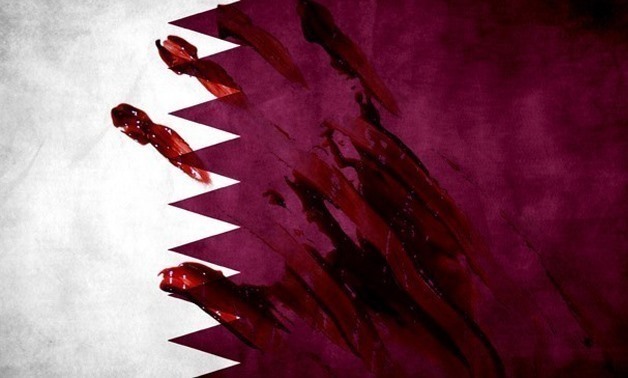
FILE – Qatar's Flag
CAIRO – 25 December 2017: In 2017, Gulf plunged into the biggest diplomatic crisis in years due to Qatari regime’s policy aimed at funding terrorism, inciting violence and chaos in neighboring countries. Egypt Today gives a quick glimpse at what the Qatari regime has gained from their stubborn, independent policy in 2017.
Putting entities in terrorist lists
Since June 2017, the Arab Quartet, including Bahrain, Egypt, the United Arab Emirates and Saudi Arabia issued three Qatar-linked terror lists. On June 9, 59 individuals and 12 entities in Qatar were designated as terrorists.
As a part of their ongoing commitment to combat terrorism, the four copuntries updated their respective lists of designated terrorist organizations and individuals. As of July 24, the second terrorist list was announced, including another nine entities and nine individuals.
Despite that, Qatar has continued funding terrorism and preserved its stubbornness. Consequently, Bahrain, Egypt, the UAE and Saudi Arabia extended their terror lists on November 23, adding two entities and 11 individuals over ties to terrorism.
Qatar’s economic losses
In this regard, Saudi Arabia closed Qatar’s only land border, and its neighboring countries have imposed travel bans on Qatari airspace, causing a huge inflation and food crisis in Qatar as it mainly depends on importing food.
Disturbances in imports have led to higher food prices, which hiked from -1.9 percent in May to 2.4 percent in June and 4.5 percent in July.
After boycotting on June 5, Qatar has also incurred many economic losses as the banking sector, GDP growth, stock market, available assets are hit hard.
As foreign funds keep declining, Qatar’s stock index fell to a five-year low Wednesday, bringing total losses since the boycott announcement on June 5, down to approximately 18 percent.
The boycott impacted Qatar’s gross domestic product's (GDP) performance, as overall economic growth upped 0.6 percent in the second quarter (Q2) year-on-year, affected by a 2.7 percent annual contraction in the mining and quarrying sector, and the slowing down of the non-oil sector to 3.9 percent, according to official data.
The diplomatic boycott also has shaped burdens for the Qatari banking system. Pressure on foreign reserves was witnessed as the Qatari Central Bank noticed in July the outflows of funds from some non-residents.
Qatar escalated the crisis by resorting to Turkey and Iran to secure food and water supplies, ignoring the demands set by Arab countries, which include downgrading diplomatic ties with Iran and closing a Turkish airbase in Qatar.
Qatar's Economy Minister, Ahmed bin Jassim Al-Thani, Iran's Minister of Communications and Information Technology Mahmoud Vaezi, and Turkey’s Minister of Economy Nihat Zeybekci, met on August 5 in Tehran to discuss means of enhancing economic relations.
During the meeting, the three countries discussed land trade routes that could be used to ship Turkish goods from Turkey to Qatar through Iran.
Its designations as a state sponsor of terrorism
Qatar was designated a state sponsor of terrorism before the international forums. Qatari opposition in London held its first conference “The Qatar, Global Security and Stability” in September to discuss democracy, human rights, press freedom and counter-terrorism in Qatar.
During the conference, Qatari opposition Khalid Al-Hail declared that Qatari regime should be changed, calling the conference to make Qatari Sheikh Abdullah Al-Thani, son of the late Emir of Qatar Ali bin Abdullah Al-Thani, succeed Tamim.
Opposition and anger toward Qatari regime
Due to the deteriorating economy, travel bans and complicated political crisis between Qatar and its neighboring countries especially after Qatar had resorted to Turkey and Iran, twenty members of “Al Thani,” the ruling Royal family in Qatar, held an opposition meeting on December 19 against the policies of the Qatari Emir Tamim bin Hammad.
In addition, through their media mouthpiece on social networks, the Qatari opposition called for protests across the country on October 13. Qatar, boycotted by four Arab countries over funding terrorism, is witnessing internal political struggles not far from what can be called economic depression, cited by international business organizations.

Comments
Leave a Comment